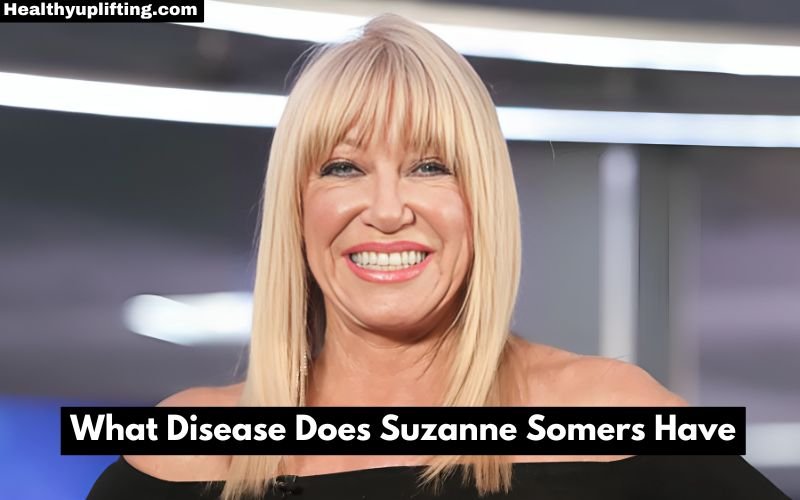Suzanne Somers, a beloved actress, author, and health advocate, is widely known for her roles in classic television shows like Three’s Company and Step by Step. However, beyond her successful career in Hollywood, Somers has also been in the public eye for her health journey, particularly her battle with cancer. In this article, we will explore Suzanne Somers’ experience with cancer, her approach to treatment, and the broader implications of her story for cancer patients and survivors.
Suzanne Somers: A Brief Biography
Before delving into her health struggles, it’s essential to understand who Suzanne Somers is and the impact she has had on popular culture and health advocacy. Born on October 16, 1946, in San Bruno, California, Suzanne Somers grew up in a working-class family. She rose to fame in the 1970s as Chrissy Snow, the ditzy blonde in the hit sitcom Three’s Company. The role made her a household name and solidified her status as a pop culture icon.
Beyond her acting career, Somers has written several books, many of which focus on health, wellness, and alternative medicine. Her work in this area has sparked both praise and controversy, as she often advocates for unconventional approaches to health and disease management.
Suzanne Somers’ Battle with Cancer
The most significant health challenge that Suzanne Somers has faced is breast cancer. Diagnosed in April 2000, Somers’ journey with cancer has been both public and, at times, polarizing. Her experience with the disease and her decisions regarding treatment have had a profound impact on her life and her public image.

The Diagnosis
In 2000, Suzanne Somers received a diagnosis that would change her life: breast cancer. Like many women who receive such news, Somers was undoubtedly shaken. However, her approach to dealing with the disease would soon set her apart from many others.
Breast cancer is one of the most common cancers among women worldwide, with millions of new cases diagnosed each year. It involves the growth of malignant cells in the breast tissue, which can spread to other parts of the body if not treated promptly and effectively. Treatment typically involves a combination of surgery, radiation, and chemotherapy, although the exact regimen depends on the stage and type of cancer.
Somers’ Approach to Treatment
Suzanne Somers made headlines not just for her diagnosis but also for the way she chose to treat her breast cancer. While many patients opt for conventional treatments such as chemotherapy and radiation, Somers decided to take a different path.
Somers declined chemotherapy and radiation, opting instead for a combination of surgery and alternative treatments. She underwent a lumpectomy, a surgical procedure to remove the cancerous tumor from her breast. After the surgery, rather than follow the standard course of chemotherapy and radiation, Somers chose to use Iscador, an extract made from mistletoe, which is used in some alternative medicine circles to treat cancer.
In addition to Iscador, Somers also embraced other alternative treatments and lifestyle changes. She focused on a diet rich in organic foods, regular exercise, and the use of bioidentical hormone replacement therapy (BHRT). This combination of approaches was consistent with Somers’ long-standing advocacy for natural and holistic health practices.
The Controversy Surrounding Her Treatment Choices
Suzanne Somers’ decision to forgo conventional cancer treatments in favor of alternative methods sparked significant controversy. Many in the medical community were critical of her approach, arguing that it could set a dangerous precedent for other cancer patients. They expressed concerns that Somers’ high profile could lead some patients to reject proven treatments in favor of less effective or unproven alternatives.
The American Cancer Society and other organizations emphasize the importance of evidence-based treatments for cancer, pointing out that chemotherapy, radiation, and surgery have been rigorously tested and have saved countless lives. The use of alternative treatments, while sometimes beneficial as complementary therapies, is generally not recommended as a sole treatment for cancer.
Somers, however, has remained steadfast in her belief that her approach was the right one for her. She has spoken openly about her decision and the reasons behind it, often citing a desire to avoid the harsh side effects associated with conventional cancer treatments. Her experience has fueled her advocacy for alternative medicine and has led her to write several books on the topic.
Life After Cancer
Since her diagnosis and treatment, Suzanne Somers has remained cancer-free, a fact that she attributes to her alternative treatment regimen and healthy lifestyle. Her experience with cancer has also deepened her commitment to health advocacy, particularly in the areas of cancer prevention and treatment.
Somers has continued to write and speak about her health journey, often emphasizing the importance of patient autonomy and the right to choose one’s own path in dealing with disease. She has also become a vocal advocate for bioidentical hormone replacement therapy, which she credits with helping her maintain her health and vitality after cancer.
While her approach to cancer treatment remains controversial, there is no denying that Suzanne Somers has had a significant impact on the conversation surrounding cancer and alternative medicine. Her story highlights the complex and deeply personal nature of health decisions and the ongoing debate over the role of alternative treatments in modern medicine.
Understanding Breast Cancer: A Broader Perspective
To fully appreciate Suzanne Somers’ journey with breast cancer, it’s essential to understand the disease itself, including its causes, symptoms, and treatment options. Breast cancer is a complex disease with many factors influencing its development and progression.
Causes and Risk Factors
Breast cancer occurs when cells in the breast begin to grow uncontrollably, forming a tumor that can spread to other parts of the body. The exact cause of breast cancer is not fully understood, but several risk factors have been identified. These include:
- Genetic Factors: Mutations in certain genes, such as BRCA1 and BRCA2, significantly increase the risk of breast cancer. Women with a family history of breast cancer are also at higher risk.
- Hormonal Factors: Exposure to estrogen over a long period, such as through early menstruation or late menopause, can increase the risk of breast cancer. Hormone replacement therapy (HRT), particularly when it involves synthetic hormones, has also been linked to an increased risk.
- Lifestyle Factors: Diet, exercise, alcohol consumption, and obesity can all influence the risk of developing breast cancer. A sedentary lifestyle and poor diet, in particular, have been associated with higher rates of the disease.
- Environmental Factors: Exposure to certain chemicals and radiation has been linked to an increased risk of breast cancer. This includes exposure to radiation therapy for other cancers and chemicals found in some personal care products.
- Age: The risk of breast cancer increases with age, with most cases diagnosed in women over the age of 50.
Symptoms and Detection
Early detection of breast cancer is crucial for successful treatment. Common symptoms of breast cancer include:
- A lump or thickening in the breast or underarm area.
- Changes in the size, shape, or appearance of the breast.
- Dimpling or puckering of the skin on the breast.
- Nipple discharge, particularly if it is bloody.
- Pain in the breast or nipple.
Regular screening, including mammograms and self-examinations, is essential for catching breast cancer in its early stages. Women are encouraged to begin regular mammograms at age 40, although those with a higher risk may need to start earlier.
Conventional Treatment Options
The treatment of breast cancer typically involves a combination of surgery, radiation therapy, chemotherapy, hormone therapy, and targeted therapy. The choice of treatment depends on the stage and type of cancer, as well as the patient’s overall health and preferences.
- Surgery: Surgical options include lumpectomy (removal of the tumor and some surrounding tissue) and mastectomy (removal of one or both breasts). Lymph node removal may also be necessary if the cancer has spread.
- Radiation Therapy: This treatment uses high-energy rays to target and kill cancer cells. It is often used after surgery to eliminate any remaining cancer cells.
- Chemotherapy: Chemotherapy involves the use of drugs to kill cancer cells or stop their growth. It is often used in combination with surgery and radiation.
- Hormone Therapy: For hormone receptor-positive breast cancers, hormone therapy can be used to block the effects of estrogen or lower estrogen levels in the body.
- Targeted Therapy: This approach involves drugs that specifically target cancer cells with certain genetic mutations or proteins, sparing healthy cells.
Alternative Treatments and Complementary Therapies
In addition to conventional treatments, some patients explore alternative treatments and complementary therapies. These can include:
- Dietary Changes: A focus on organic, whole foods and specific dietary plans designed to reduce inflammation and support the immune system.
- Supplements: The use of vitamins, minerals, and herbal supplements to boost the body’s natural defenses.
- Mind-Body Practices: Techniques such as meditation, yoga, and acupuncture to reduce stress and improve overall well-being.
- Homeopathy and Naturopathy: Systems of medicine that use natural remedies to support the body’s healing processes.
- Bioidentical Hormone Replacement Therapy (BHRT): The use of hormones that are chemically identical to those produced by the body, often promoted as a more natural alternative to synthetic hormone replacement therapy.
While some of these approaches can be beneficial as complementary therapies, it’s important for patients to work closely with their healthcare providers to ensure that any alternative treatments do not interfere with conventional care.
The Broader Debate: Conventional vs. Alternative Treatments
Suzanne Somers’ choice to forgo conventional cancer treatments in favor of alternative methods has sparked a broader debate about the role of alternative treatments in cancer care. This debate touches on several key issues:
- Patient Autonomy: Patients have the right to make their own decisions about their treatment, including the choice to pursue alternative therapies. However, healthcare providers have a responsibility to ensure that patients are fully informed about the risks and benefits of all treatment options.
- Efficacy and Evidence: Conventional treatments for cancer have been rigorously tested and proven effective in many cases. Alternative treatments, while often appealing due to their natural origins and fewer side effects, may lack the same level of evidence to support their use.
- Holistic Care: There is growing recognition of the importance of addressing the whole person in cancer care, including physical, emotional, and spiritual needs. This has led to increased interest in integrative medicine, which combines conventional treatments with complementary therapies.
- The Role of the Medical Community: The medical community faces the challenge of respecting patient choices while also advocating for evidence-based care. This requires open communication and a willingness to explore all options in a supportive and non-judgmental way.
See Also: What Disease Does Suni Lee Have?
FAQs
What type of cancer did Suzanne Somers have?
Suzanne Somers was diagnosed with breast cancer in 2000. She opted for surgery combined with alternative treatments instead of conventional chemotherapy.
What alternative treatment did Suzanne Somers use for her cancer?
Suzanne Somers used Iscador, a mistletoe extract, along with a healthy diet, bioidentical hormone replacement therapy, and other holistic approaches.
Is Suzanne Somers still cancer-free?
Yes, Suzanne Somers has remained cancer-free since her diagnosis and attributes her health to her chosen alternative treatments and lifestyle changes.
Conclusion
Suzanne Somers’ battle with breast cancer and her decision to pursue alternative treatments have made her a prominent figure in the ongoing debate over cancer care. While her approach has been controversial, it has also sparked important conversations about patient autonomy, the role of alternative medicine, and the need for a holistic approach to health.
For those facing a cancer diagnosis, Suzanne Somers’ story serves as a reminder of the importance of being informed, weighing all options carefully, and working closely with healthcare providers to create a treatment plan that aligns with one’s values and beliefs. Whether one chooses conventional treatments, alternative therapies, or a combination of both, the goal remains the same: to fight the disease and maintain the best possible quality of life.

